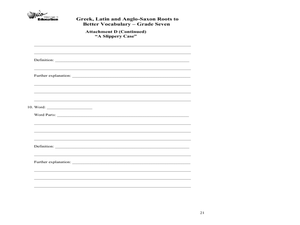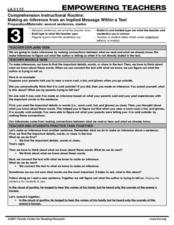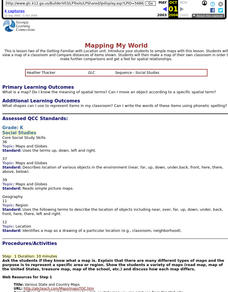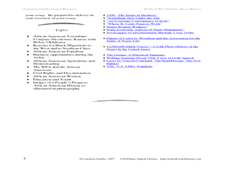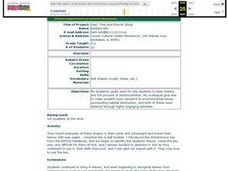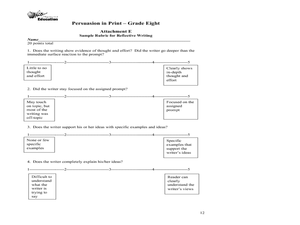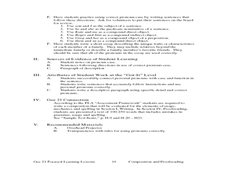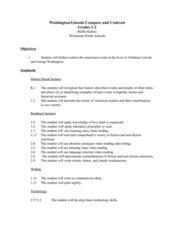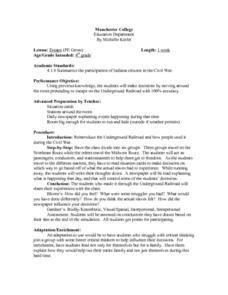Curated OER
Illinois Wild
Sixth graders identify different animals native to Illinois. They research a specific animal to study more about its characteristics, examine what makes a habitat, and recognize the difference between a food web and food chain.
Curated OER
Greek, Latin and Anglo-Saxon Roots to Better Vocabulary
Practice vocabulary skills with this word analysis lesson. Middle schoolers examine the roots of unfamiliar words and use their knowledge of roots to discern meaning through word analysis.
Curated OER
Making an Inference from an Implied Message Within a Text
Show your scholars that they make inferences every day and might not even know it. Through scaffolded instruction, they break down the process of drawing information from context. Using example sentences and didactic questioning,...
Curated OER
Mapping My World
Students are introduced to simple maps and view a map of a classroom and compare distances of items shown.
Curated OER
The Elderly Poor: Human Rights
Students examine facts about the elderly population of the United States that lives in poverty through the context of universal human rights. They participate in class discussion, review census records, read case studies, interview...
Curated OER
Geology Rocks
Students discuss information relating to Illinois geology. They examine top mineral resources in Illinois to find detailed information about geodes and where they can be found. Students complete geode lab to explore external structure of...
Curated OER
Animal Legends
Seventh graders review the concept of a legend. Using the internet, they research animals found in Illinois. They write their own legends based on the animal they researched. They share their story and show pictures of the animals to the...
Curated OER
A New Deal for African Americans
Students consider how New Deal programs impacted African Americans. In this New Deal lesson, students collaborate to research Internet and print sources regarding selected New Deal programs and African Americans....
Curated OER
Build Illinois
Learners examine the history of the formation of Illinois. Traveling virtually between time periods, they describe each period and compare them with how Illinois is now. They work together to complete an activity and worksheet.
Curated OER
Leaf, Tree and Prairie Study
Students are introduced to the topic of Botany and the process of photosynthesis. Using various habitats, they research the amount of destruction it is facing and how to solve the problem. They make a leaf booklet with leaves they find...
Curated OER
Persuasion in Print
Advertisers target teenagers. Groups select three magazine advertisements for similar products, analyze the appeals used in each, create a poster that features the persuasive techniques used, and present their findings to the class. The...
Curated OER
Rock River Watershed
Students discover what a watershed is and which one they live in. Using the internet, they research why watersheds are important to an ecosystem and how to keep them from getting polluted. They use a map to locate various items within a...
Curated OER
History of Natural Resources in the U.S.
Students define conservation, exploitation and preservation, identify legislation related to conservation and environmental issues, and identify leaders and organizations that were key to the conservation and environmental movements.
Curated OER
Linear, Square, and Cubic Units
Linear, square, and cubic units are all investigated as different types of packages are measured. The teacher will need supplies such as a box of aluminum foil, a package of ribbon, and a bag of mulch. The class determines the...
Curated OER
Using Personal Pronouns Correctly
Complete personal pronoun practice activities. Pupils use correct personal pronoun form in sentences the teacher writes on the board. They review the function of a pronoun and the various cases and practice placing personal pronouns by...
Curated OER
Main Idea/Supporting Details Scavenger Hunt
Engage your class in a scavenger hunt to find the main ideas and supporting details in a text. They follow the teacher while s/he models how to determine main idea and find supporting details, and then they work independently. A fun...
Curated OER
Civil War Museum Exhibit
Fourth graders summarize the participation of Indiana citizens in the Civil War. They research an assigned topic and build a museum exhibit that displays at least five points of information relating to the topic. Students write a...
Curated OER
Washington/Lincoln Compare and Contrast
Students examine the lives of George Washington and Abraham Lincoln. Using the information, they complete a Venn diagram discovering what the two men had in common. In groups, they review a timeline made in an earlier lesson plan and...
Curated OER
Secrets of the Presidents
Students research little-known facts about presidents of the United Statesusing the Internet. They complete a printable technology activity.
Curated OER
Paul Revere's Ride
Fifth graders investigate the life of Paul Revere. They compose a timeline of some of the major historical events leading to the American Revolution. The purpose of the ride is the focus of the lesson and the information is later...
Curated OER
Our Government Leaders
The students will use computer software to develop a KWL chart to determine the roles of different government officials. The chart will reveal what they already know. Then the instructor will give new information as needed.
Curated OER
Escape - Civil War
Fourth graders role play the Underground Railroad in this lesson. They review the Underground Railroad and how people used it during the Civil War. They then are divided into groups, and role play with each group taking a different...
Curated OER
The foreign and domestic policies of Lyndon B. Johnson
Eleventh graders study and evaluate the successes and failures of LBJ's domestic and foreign policies. They formulate historical questions and defend findings based on inquiry and interpretation. Each student identifies, analyzes and...
Curated OER
The Bill of Rights
Ninth graders research the Bill of Rights and consider which freedoms are the most important for them. They consider the Bill in detail and then write to their Congressperson about something they would like to see done or changed.

